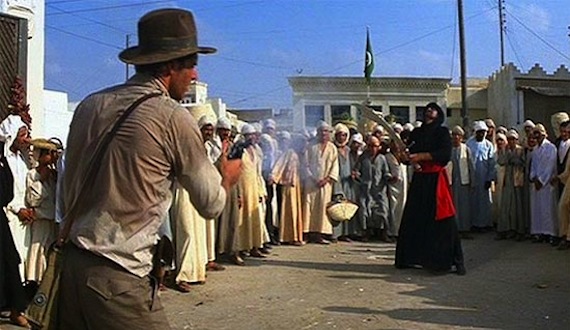Film Friday
 Steven Spielberg originally had different plans for what has proved to be the most popular scene in his 1981 blockbuster Raiders of the Lost Arc. Indiana Jones is racing through a market fighting, and defeating, a series of assailants. Finally he runs up against one who seems the most dangerous of all, an Arab who is whirling around a sword or two in intricate maneuvers (at least that’s how I remember the scene) and uttering a challenge. Audiences cheered when Indiana, having had enough, in exasperation pulls out a gun and shoots him. It is hardly fair play but that’s part of the exhilarating shock.
Steven Spielberg originally had different plans for what has proved to be the most popular scene in his 1981 blockbuster Raiders of the Lost Arc. Indiana Jones is racing through a market fighting, and defeating, a series of assailants. Finally he runs up against one who seems the most dangerous of all, an Arab who is whirling around a sword or two in intricate maneuvers (at least that’s how I remember the scene) and uttering a challenge. Audiences cheered when Indiana, having had enough, in exasperation pulls out a gun and shoots him. It is hardly fair play but that’s part of the exhilarating shock.
Exhilarating though it may be, however, it points to an American wish fulfillment that threatens to have disastrous consequences in the Middle East.
Here’s a little background before I explain why. According to Internet Movie Database, the fight was originally supposed to be a complex affair:
The famous scene in which Indy shoots a marauding and flamboyant swordsman was not in the original script. Harrison Ford was supposed to use his whip to get the swords out of his attacker’s hands, but the food poisoning he and the rest of the crew had gotten made him too sick to perform the stunt. After several unsuccessful tries, Ford suggested “shooting the sucker.” Steven Spielberg immediately took up the idea and the scene was successfully filmed.
Such wild fantasies—of pulling out a gun rather than deftly wielding a bullwhip—were on display in last week’s Republican debate about foreign affairs. Mitt Romney, Newt Gingrich, Herman Cain, and Rick Santorum all said they were prepared to bomb Iran if it continued developing a nuclear bomb. If you’re the country with the largest and most powerful military in the world, you can have these fantasies.
It’s understandable why they are frustrated. As Roger Cohen of the New York Times puts it,
Like a bad movie, the Iranian nuclear crisis keeps returning. We’re now at the sequel of the sequel of the sequel. Graham Allison, a Harvard professor and leading security strategist, has compared it to a “Cuban missile crisis in slow motion.”
Iran with a bomb could well set off a nuclear arms race in one of the world’s most volatile regions. Also, fanatics in either Iran or Israel might be tempted to preemptively deploy the bomb against the other.
Taking an Indiana Jones approach, however, would have its own disastrous consequences. Cohen sums them up:
This, in the cautionary words of U.S. Defense Secretary Leon Panetta, could have “unintended consequences.” Among them: a lifeline for the weakened Islamic Republic that would lock it in for a generation; a sharp rise in American dead in neighboring Iraq and Afghanistan; direct or indirect (through Hezbollah) retaliation against Israel; a wave of radicalization just when jihadist ideology seems tired and the Arab Spring stands at a delicate juncture; a blow to the global economy from soaring oil prices; a revival of Iran’s sagging regional appeal as it becomes yet another Muslim country to face Western bombs; increased terrorism; and a subsequent Iranian race for a nuclear weapon fired by resentments as indelible as those left by the C.I.A. coup that ousted Prime Minister Mohammed Mossadegh in 1953.
So what should we do? Cohen and David Ignatius of the Washington Post are on the same page here. Both cite John F. Kennedy’s handling of the Cuban missile crisis as a model. Here’s Cohen:
Iran, more unpredictable than the Soviet Union, can be stopped short of a bomb through measures short of military action. What is needed is a contain-and-constrain policy. Contain Iran through beefed-up Israeli and Gulf defenses, a process underway. Constrain it to circle in its current nuclear ambiguity through covert undermining (Stuxnet 2.0, etc.), tough measures to block its access to hard currency, and, as a last resort, a “quarantine” similar to John Kennedy’s interdiction of shipping to Cuba during the missile crisis.
And here’s Ignatius:
The option Kennedy chose deserves some discussion now. He decided, against the advice of most advisers, on a “quarantine” of Cuba to prevent the nuclear missiles from becoming operational. It was a step well short of war (or even lethal covert action), and it left the Soviets room to maneuver. It also avoided the political fallout across Latin America that would come from bombing Cuba (similar to the destabilizing effect that bombing Iran would cause for the United States and Israel).
A quarantine of Iran’s nuclear program could take many forms, along a ladder of escalating seriousness. It would seek to enforce U.N. resolutions, peacefully. If crafted wisely, it would have the support of most U.S. allies.
To summarize: If you try running your foreign policy like a B-movie thriller, you will get (to say the least) B-movie results. If you’re up against a sword-twirling Arab (or Persian in this case), you’ve got to disarm him with subtlety and guile. It doesn’t matter that the situation makes you feel as though you have food poisoning. Suck it up and do the slow hard work of diplomacy and coalition building. It’s not anywhere near as flashy as a Spielberg movie, but who said foreign policy was supposed to be cinematic?
Addendum
After I wrote this post, I came across the following passage in a Max Steinglass blog post (in The Economist) which has a similar take. Steinglass sees a “messianic-apocalyptic streak” in both American and Israeli cultures and relates them to the scenarios we encounter in Robert Ludlum novels. He could have added a long list of films and television shows that have the same “madmen trying to blow up the world” plots:
It seems to me that the American and Israeli obsession with Iran’s nuclear weapons programme proceeds from a misguided messianic-apocalyptic streak in both countries’ political cultures. There’s a temptation to imagine the world of foreign policy as a broad extension of a Robert Ludlum novel: a desperate time-constrained race to stop evil madmen from committing atrocities. This vision is morally clarifying and inspiring. But it has little to do with reality, and it distracts the public from the actual challenges of foreign policy, which are usually messy and often involve actual sacrifices in order to achieve publicly valuable goals. Of course, in both America and Israel, distracting the public from real international challenges that might necessitate sacrifices to achieve public goals is part of the point.
Go here to subscribe to the weekly newsletter summarizing the week’s posts. Your e-mail address will be kept confidential.
